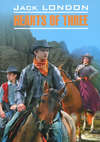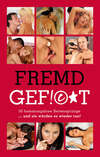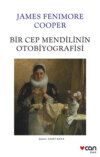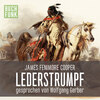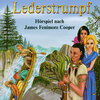Kitabı oku: «The Redskins: or, Indian and Injin. Volume 1», sayfa 12
"Und Gitty goes to visit the gal of the man who lives over yonter, in de house on der hill?" pointing to a residence of a man of the very humblest class in the town.
"Hardly! Kitty's by no means proud, but I shouldn't like her to be too thick there."
"Oh! you're an arisdograt, den, after all; else might your daughter visit dat man's daughter."
"I tell you, Grunzebach, or whatever your name may be," returned Miller, a little angrily, though a particularly good-natured man in the main, "that my gal shall not visit old Steven's da'ghters."
"Vell, I'm sure she might do as she bleases; but I dinks der Mademoiselles Littlepage might do ast dey pleases, too."
"There is but one Littlepage gal; if you saw them out this morning in the carriage, you saw two York gals and parson Warren's da'ghter with her."
"Und dis parson Warren might be rich, too?"
"Not he; he hasn't a sixpence on 'arth but what he gets from the parish. Why he is so poor his friends had to edicate his da'ghter, I have heern say, over and over!"
"Und das Littlepage gal und de Warren gal might be goot friends?"
"They are the thickest together of any two young women in this part of the world. I've never seen two gals more intimate. Now, there's a young lady in the town, one Opportunity Newcome, who, one might think, would stand before Mary Warren at the big house, any day in the week, but she doesn't! Mary takes all the shine out on her."
"Which ist der richest, Obbordunity or Mary?"
"By all accounts Mary Warren has nothing, while Opportunity is thought to come next to Matty herself, as to property, of all the young gals about here. But Opportunity is no favourite at the Nest."
"Den it would seem, after all, dat dis Miss Littlebage does not choose her friends on account of riches. She likes Mary Warren, who ist boor, und she does not like Obbordunity, who ist vell to do in de vorlt. Berhaps der Littlepages be not as big arisdograts as you supposes."
Miller was bothered, while I felt a disposition to laugh. One of the commonest errors of those who, from position and habits, are unable to appreciate the links which connect cultivated society together, is to refer everything to riches. Riches, in a certain sense, as a means and through their consequences, may be a principal agent in dividing society into classes; but, long after riches have taken wings, their fruits remain, when good use has been made of their presence. So untrue is the vulgar opinion – or it might be better to say the opinion of the vulgar – that money is the one tie which unites polished society, that it is a fact which all must know who have access to the better circles of even our own commercial towns, that those circles, loosely and accidentally constructed as they are, receive with reluctance, nay, often sternly exclude, vulgar wealth from their associations, while the door is open to the cultivated who have nothing. The young, in particular, seldom think much of money, while family connections, early communications, similarity of opinions, and, most of all, of tastes, bring sets together, and often keep them together long after the golden band has been broken.
But men have great difficulty in comprehending things that lie beyond their reach; and money being apparent to the senses, while refinement, through its infinite gradations, is visible principally, and, in some cases, exclusively to its possessors, it is not surprising that common minds should refer a tie that, to them, would otherwise be mysterious, to the more glittering influence, and not to the less obvious. Infinite, indeed, are the gradations of cultivated habits; nor are as many of them the fruits of caprice and self-indulgence as men usually suppose. There is a common sense, nay, a certain degree of wisdom, in the laws of even etiquette, while they are confined to equals, that bespeak the respect of those who understand them. As for the influence of associations on men's manners, on their exteriors, and even on their opinions, my uncle Ro has long maintained that it is so apparent that one of his time of life could detect the man of the world, at such a place as Saratoga even, by an intercourse of five minutes; and what is more, that he could tell the class in life from which he originally emerged. He tried it, the last summer, on our return from Ravensnest, and I was amused with his success, though he made a few mistakes, it must be admitted.
"That young man comes from the better circles, but he has never travelled," he said, alluding to one of a group which still remained at table; "while he who is next him has travelled, but commenced badly." This may seem a very nice distinction, but I think it is easily made. "There are two brothers, of an excellent family in Pennsylvania," he continued, "as one might know from the name; the eldest has travelled, the youngest has not." This was a still harder distinction to make, but one who knew the world as well as my uncle Ro could do it. He went on amusing me by his decisions – all of which were respectable, and some surprisingly accurate – in this way for several minutes. Now, like has an affinity to like, and in this natural attraction is to be found the secret of the ordinary construction of society. You shall put two men of superior minds in a room full of company, and they will find each other out directly, and enjoy the accident. The same is true as to the mere modes of thinking that characterize social castes; and it is truer in this country, perhaps, than most others, from the mixed character of our associations. Of the two, I am really of opinion that the man of high intellect, who meets with one of moderate capacity, but of manners and social opinions on a level with his own, has more pleasure in the communication than with one of equal mind, but of inferior habits.
That Patt should cling to one like Mary Warren seemed to me quite as natural as that she should be averse to much association with Opportunity Newcome. The money of the latter, had my sister been in the least liable to such an influence, was so much below what she had been accustomed, all her life, to consider affluence, that it would have had no effect, even had she been subject to so low a consideration in regulating her intercourse with others. But this poor Tom Miller could not understand. He could "only reason from what he knew," and he knew little of the comparative notions of wealth, and less of the powers of cultivation on the mind and manners. He was struck, however, with a fact that did come completely within the circle of his own knowledge, and that was the circumstance that Mary Warren, while admitted to be poor, was the bosom friend of her whom he was pleased to call, sometimes, the "Littlepage gal." It was easy to see he felt the force of this circumstance; and it is to be hoped that, as he was certainly a wiser, he also became a better man, on one of the most common of the weaknesses of human frailty.
"Wa-a-l," he replied to my uncle's last remark, after fully a minute of silent reflection, "I don't know! It would seem so, I vow; and yet it hasn't been my wife's notion, nor is it Kitty's. You're quite upsetting my idees about aristocrats; for though I like the Littlepages, I've always set 'em down as desp'rate aristocrats."
"Nein, nein; dem as vat you calls dimigogues be der American arisdograts. Dey gets all der money of der pooblic, and haf all der power, but dey gets a little mads because dey might not force demselves on der gentlemen and laties of der coontry, as vell as on der lands und der offices!"
"I swan! I don't know but this may be true! A'ter all, I don't know what right anybody has to complain of the Littlepages."
"Does dey dreat beoples vell, as might coome to see dem?"
"Yes, indeed! if folks treat them well, as sometimes doesn't happen. I've seen hogs here" – Tom was a little Saxon in his figures, but their nature will prove their justification – "I've seen hogs about here, bolt right in before old Madam Littlepage, and draw their chairs up to her fire, and squirt about the tobacco, and never think of even taking off their hats. Them folks be always huffy about their own importance, though they never think of other people's feelin's."
We were interrupted by the sound of wheels, and looking round, we perceived that the carriage of my grandmother had driven up to the farm-house door, on its return home. Miller conceived it to be no more than proper to go and see if he were wanted, and we followed him slowly, it being the intention of my uncle to offer his mother a watch, by way of ascertaining if she could penetrate his disguise.
CHAPTER X
"Will you buy any tape,
Or lace for your cape? —
Come to the pedlar,
Money's a medler
That doth utter all men's ware-a."
Winter's Tale.
There they sat, those four young creatures, a perfect galaxy of bright and beaming eyes. There was not a plain face among them; and I was struck with the circumstance of how rare it was to meet with a youthful and positively ugly American female. Kitty, too, was at the door by the time we reached the carriage, and she also was a blooming and attractive-looking girl. It was a thousand pities that she spoke, however; the vulgarity of her utterance, tone of voice, cadences, and accent, the latter a sort of singing whine, being in striking contrast to a sort of healthful and vigorous delicacy that marked her appearance. All the bright eyes grew brighter as I drew nearer, carrying the flute in my hand; but neither of the young ladies spoke.
"Buy a vatch, ma'ams," said uncle Ro, approaching his mother, cap in hand, with his box open.
"I thank you, friend; but I believe all here are provided with watches already."
"Mine ist ferry sheaps."
"I dare say they may be," returned dear grandmother, smiling; "though cheap watches are not usually the best. Is that very pretty pencil gold?"
"Yes, ma'ams; it ist of goot gold. If it might not be, I might not say so."
I saw suppressed smiles among the girls; all of whom, however, were too well-bred to betray to common observers the sense of the ridiculous that each felt at the equivoque that suggested itself in my uncle's words.
"What is the price of this pencil," asked my grandmother.
Uncle Roger had too much tact to think of inducing his mother to make a purchase as he had influenced Miller, and he mentioned something near the true value of the "article," which was fifteen dollars.
"I will take it," returned my grandmother, dropping three half eagles into the box; when, turning to Mary Warren, she begged her acceptance of the pencil, with as much respect in her manner as if she solicited instead of conferred a favour.
Mary Warren's handsome face was covered with blushes; she looked pleased, and she accepted the offering, though I thought she hesitated one moment about the propriety of so doing, most probably on account of its value. My sister asked to look at this little present, and after admiring it, it passed from hand to hand, each praising its shape and ornaments. All my uncle's wares, indeed, were in perfect good taste, the purchase having been made of an importer of character, and paid for at some cost. The watches, it is true, were, with one or two exceptions, cheap, as were most of the trinkets; but my uncle had about his person a watch, or two, and some fine jewelry, that he had brought from Europe himself, expressly to bestow in presents, among which had been the pencil in question, and which he had dropped into the box but a moment before it was sold.
"Wa-a-l, Madam Littlepage," cried Miller, who used the familiarity of one born on the estate, "this is the queerest watch-pedlar I've met with, yet. He asks fifteen dollars for that pencil, and only four for this watch!" showing his own purchase as he concluded.
My grandmother took the watch in her hand, and examined it attentively.
"It strikes me as singularly cheap!" she remarked, glancing a little distrustfully, as I fancied, at her son, as if she thought he might be selling his brushes cheaper than those who only stole the materials, because he stole them ready made. "I know that these watches are made for very little in the cheap countries of Europe, but one can hardly see how this machinery was put together for so small a sum."
"I has 'em, matam, at all brices," put in my uncle.
"I have a strong desire to purchase a good lady's watch, but should a little fear buying of any but a known and regular dealer."
"You needn't fear us, ma'am," I ventured to say. "If we might sheat anypodies, we shouldn't sheat so goot a laty."
I do not know whether my voice struck Patt's ear pleasantly, or a wish to see the project of her grandmother carried out at once, induced my sister to interfere; but interfere she did, and that by urging her aged parent to put confidence in us. Years had taught my grandmother caution, and she hesitated.
"But all these watches are of base metal, and I want one of good gold and handsome finish," observed my grandmother.
My uncle immediately produced a watch that he had bought of Blondel, in Paris, for five hundred francs, and which was a beautiful little ornament for a lady's belt. He gave it to my grandmother, who read the name of the manufacturer with some little surprise. The watch itself was then examined attentively, and was applauded by all.
"And what may be the price of this?" demanded my grandmother.
"One hoondred dollars, matam; and sheaps at dat."
Tom Miller looked at the bit of tinsel in his own hand, and at the smaller, but exquisitely-shaped "article" that my grandmother held up to look at, suspended by its bit of ribbon, and was quite as much puzzled as he had evidently been a little while before, in his distinctions between the rich and the poor. Tom was not able to distinguish the base from the true; that was all.
My grandmother did not appear at all alarmed at the price, though she cast another distrustful glance or two, over her spectacles, at the imaginary pedlar. At length the beauty of the watch overcame her.
"If you will bring this watch to yonder large dwelling, I will pay you the hundred dollars for it," she said; "I have not as much money with me here."
"Ja, ja – ferry goot; you might keep das vatch, laty, and I will coome for der money after I haf got some dinners of somebodys."
My grandmother had no scruple about accepting of the credit, of course, and she was about to put the watch in her pocket, when Patt laid her little gloved hand on it, and cried —
"Now, dearest grandmother, let it be done at once – there is no one but us three present, you know!"
"Such is the impatience of a child!" exclaimed the elder lady, laughing. "Well, you shall be indulged. I gave you that pencil for a keep-sake, Mary, only en attendant, it having been my intention to offer a watch, as soon as a suitable one could be found, as a memorial of the sense I entertain of the spirit you showed during that dark week in which the anti-renters were so menacing. Here, then, is such a watch as I might presume to ask you to have the goodness to accept."
Mary Warren seemed astounded! The colour mounted to her temples; then she became suddenly pale. I had never seen so pretty a picture of gentle female distress – a distress that arose from conflicting, but creditable feelings.
"Oh! Mrs. Littlepage!" she exclaimed, after looking in astonishment at the offering for a moment, and in silence. "You cannot have intended that beautiful watch for me!"
"For you, my dear; the beautiful watch is not a whit too good for my beautiful Mary."
"But, dear, dear Mrs. Littlepage, it is altogether too handsome for my station – for my means."
"A lady can very well wear such a watch; and you are a lady in every sense of the word, and so you need have no scruples on that account. As for the means, you will not misunderstand me if I remind you that it will be bought with my means, and there can be no extravagance in the purchase."
"But we are so poor, and that watch has so rich an appearance! It scarcely seems right."
"I respect your feelings and sentiments, my dear girl, and can appreciate them. I suppose you know I was once as poor, nay, much poorer than you are, yourself."
"You, Mrs. Littlepage! No, that can hardly be. You are of an affluent and very respectable family, I know."
"It is quite true, nevertheless, my dear. I shall not affect extreme humility, and deny that the Malbones did and do belong to the gentry of the land, but my brother and myself were once so much reduced as to toil with the surveyors, in the woods, quite near this property. We had then no claim superior to yours, and in many respects were reduced much lower. Besides, the daughter of an educated and well-connected clergyman has claims that, in a worldly point of view alone, entitle her to a certain consideration. You will do me the favour to accept my offering?"
"Dear Mrs. Littlepage! I do not know how to refuse you, or how to accept so rich a gift! You will let me consult my father, first?"
"That will be no more than proper, my dear," returned my beloved grandmother, quietly putting the watch into her own pocket; "Mr. Warren, luckily, dines with us, and the matter can be settled before we sit down to table."
This ended the discussion, which had commenced under an impulse of feeling that left us all its auditors. As for my uncle and myself, it is scarcely necessary to say we were delighted with the little scene. The benevolent wish to gratify, on the one side, with the natural scruples on the other, about receiving, made a perfect picture for our contemplation. The three girls, who were witnesses of what passed, too much respected Mary's feelings to interfere, though Patt restrained herself with difficulty. As to Tom Miller and Kitty, they doubtless wondered why "Warren's gal" was such a fool as to hesitate about accepting a watch that was worth a hundred dollars. This was another point they did not understand.
"You spoke of dinner," continued my grandmother, looking at my uncle. "If you and your companion will follow us to the house, I will pay you for the watch, and order you a dinner in the bargain."
We were right down glad to accept this offer, making our bows and expressing our thanks, as the carriage whirled off. We remained a moment, to take our leave of Miller.
"When you've got through at the Nest," said that semi-worthy fellow, "give us another call here. I should like my woman and Kitty to have a look at your finery, before you go down to the village with it."
With a promise to return to the farm-house, we proceeded on our way to the building which, in the familiar parlance of the country, was called the Nest, or the Nest House, from Ravensnest, its true name, and which Tom Miller, in his country dialect, called the "Neest." The distance between the two buildings was less than half a mile, the grounds of the family residence lying partly between them. Many persons would have called the extensive lawns which surrounded my paternal abode a park, but it never bore that name with us. They were too large for a paddock, and might very well have come under the former appellation; but, as deer, or animals of any sort, except those that are domestic, had never been kept within it, the name had not been used. We called them the grounds – a term which applies equally to large and small enclosures of this nature – while the broad expanse of verdure which lies directly under the windows goes by the name of the lawn. Notwithstanding the cheapness of land among us, there has been very little progress made in the art of landscape gardening; and if we have anything like park scenery, it is far more owing to the gifts of a bountiful nature than to any of the suggestions of art. Thanks to the cultivated taste of Downing, as well as to his well-directed labours, this reproach is likely to be soon removed, and country life will acquire this pleasure, among the many others that are so peculiarly its own. After lying for more than twenty years – a stigma on the national taste – disfigured by ravines or gullies, and otherwise in a rude and discreditable condition, the grounds of the White House have been brought into a condition to denote that they are the property of a civilized country. The Americans are as apt at imitation as the Chinese, with a far greater disposition to admit of change; and little beyond good models are required to set them on the right track. But it is certain that, as a nation, we have yet to acquire nearly all that belongs to the art I have mentioned that lies beyond avenues of trees, with an occasional tuft of shrubbery. The abundance of the latter, that forms the wilderness of sweets, the masses of flowers that spot the surface of Europe, the beauty of curved lines, and the whole finesse of surprises, reliefs, back-grounds and vistas, are things so little known among us as to be almost "arisdogratic," as my uncle Ro would call the word.
Little else had been done at Ravensnest than to profit by the native growth of the trees, and to take advantage of the favourable circumstances in the formation of the grounds. Most travellers imagine that it might be an easy thing to lay out a park in the virgin forest, as the axe might spare the thickets, and copses, and woods, that elsewhere are the fruits of time and planting. This is all a mistake, however, as the rule; though modified exceptions may and do exist. The tree of the American forest shoots upward toward the light, growing so tall and slender as to be unsightly; and even when time has given its trunk is due size, the top is rarely of a breadth to ornament a park or a lawn, while its roots, seeking their nourishment in the rich alluvium formed by the decayed leaves of a thousand years, lie too near the surface to afford sufficient support after losing the shelter of its neighbours. It is owing to reasons like these that the ornamental grounds of an American country-house have usually to be commenced ab origine, and that natural causes so little aid in finishing them.
My predecessors had done a little towards assisting nature, at the Nest, and what was of almost equal importance, in the state of knowledge on this subject as it existed in the country sixty years since, they had done little to mar her efforts. The results were, that the grounds of Ravensnest possess a breadth that is the fruit of the breadth of our lands, and a rural beauty which, without being much aided by art, was still attractive. The herbage was kept short by sheep, of which one thousand, of the fine wool, were feeding on the lawns, along the slopes, and particularly on the distant heights, as we crossed the grounds on our way to the doors.
The Nest House was a respectable New York country dwelling, as such buildings were constructed among us in the last quarter of the past century, a little improved and enlarged by the second and third generations of its owners. The material was of stone, the low cliff on which it stood supplying enough of an excellent quality; and the shape of the main corps de batiment as near a square as might be. Each face of this part of the constructions offered five windows to view, this being almost the prescribed number for a country residence in that day, as three have since got to be in towns. These windows, however, had some size, the main building being just sixty feet square, which was about ten feet in each direction larger than was common so soon after the revolution. But wings had been added to the original building, and that on a plan which conformed to the shape of a structure in square logs, that had been its predecessor on its immediate site. These wings were only of a story and a half each, and doubling on each side of the main edifice just far enough to form a sufficient communication, they ran back to the very verge of a cliff some forty feet in height, overlooking, at their respective ends, a meandering rivulet, and a wide expanse of very productive flats, that annually filled my barns with hay and my cribs with corn. Of this level and fertile bottom-land there was near a thousand acres, stretching in three directions, of which two hundred belonged to what was called the Nest Farm. The remainder was divided among the farms of the adjacent tenantry. This little circumstance, among the thousand-and-one other atrocities that were charged upon me, had been made a ground of accusation, to which I shall presently have occasion to advert. I shall do this the more readily, because the fact has not yet reached the ears and set in motion the tongues of legislators – Heaven bless us, how words do get corrupted by too much use! – in their enumeration of the griefs of the tenants of the State.
Everything about the Nest was kept in perfect order, and in a condition to do credit to the energy and taste of my grandmother, who had ordered all these things for the last few years, or since the death of my grandfather. This circumstance, connected with the fact that the building was larger and more costly than those of most of the other citizens of the country, had, of late years, caused Ravensnest to be termed an "aristocratic residence." This word "aristocratic," I find since my return home, has got to be a term of expansive signification, its meaning depending on the particular habits and opinions of the person who happens to use it. Thus, he who chews tobacco thinks it aristocratic in him who deems the practice nasty not to do the same; the man who stoops accuses him who is straight in the back of having aristocratic shoulders; and I have actually met with one individual who maintained that it was excessively aristocratic to pretend not to blow one's nose with his fingers. It will soon be aristocratic to maintain the truth of the familiar Latin axiom of "de gustibus non disputandum est."
As we approached the door of the Nest House, which opened on the piazza that stretched along three sides of the main building, and the outer ends of both wings, the coachman was walking his horses away from it, on the road that led to the stables. The party of ladies had made a considerable circuit after quitting the farm, and had arrived but a minute before us. All the girls but Mary Warren had entered the house, careless on the subject of the approach of two pedlars; she remained, however, at the side of my grandmother, to receive us.
"I believe in my soul," whispered uncle Ro, "that my dear old mother has a secret presentiment who we are, by her manifesting so much respect. – T'ousand t'anks, matam, t'ousand t'anks," he continued, dropping into his half-accurate half-blundering broken English, "for dis great honour, such as we might not expect das laty of das house to wait for us at her door."
"This young lady tells me that she has seen you before, and that she understands you are both persons of education and good manners, who have been driven from your native country by political troubles. Such being the case, I cannot regard you as common pedlars. I have known what it was to be reduced in fortune," – my dear grandmother's voice trembled a little – "and can feel for those who thus suffer."
"Matam, dere might be moch trut' in some of dis," answered my uncle, taking off his cap, and bowing very much like a gentleman, an act in which I imitated him immediately. "We haf seen petter tays; and my son, dere, hast peen edicatet at an university. But we are now poor pedlars of vatches, und dem dat might make moosic in der streets."
My grandmother looked as a lady would look under such circumstances, neither too free to forget present appearances, nor coldly neglectful of the past. She knew that something was due to her own household, and to the example she ought to set it, while she felt that far more was due to the sentiment that unites the cultivated. We were asked into the house, were told a table was preparing for us, and were treated with a generous and considerate hospitality that involved no descent from her own character, or that of the sex; the last being committed to the keeping of every lady.
In the mean time, business proceeded with my uncle. He was paid his hundred dollars; and all his stores of value, including rings, brooches, ear-rings, chains, bracelets, and other trinkets that he had intended as presents to his wards, were produced from his pockets, and laid before the bright eyes of the three girls – Mary Warren keeping in the back ground, as one who ought not to look on things unsuited to her fortune. Her father had arrived, however, had been consulted, and the pretty watch was already attached to the girdle of the prettier waist. I fancied the tear of gratitude that still floated in her serene eyes was a jewel of far higher price than any my uncle could exhibit.
We had been shown into the library, a room that was in the front of the house, and of which the windows all opened on the piazza. I was at first a little overcome, at thus finding myself, and unrecognized, under the paternal roof, and in a dwelling that was my own, after so many years of absence. Shall I confess it! Everything appeared diminutive and mean, after the buildings to which I had been accustomed in the old world. I am not now drawing comparisons with the palaces of princes, and the abodes of the great, as the American is apt to fancy, whenever anything is named that is superior to the things to which he is accustomed; but to the style, dwellings, and appliances of domestic life that pertain to those of other countries who have not a claim in anything to be accounted my superiors – scarcely my equals. In a word, American aristocracy, or that which it is getting to be the fashion to stigmatize as aristocratic, would be deemed very democratic in most of the nations of Europe. Our Swiss brethren have their chateaux and their habits that are a hundred times more aristocratic than anything about Ravensnest, without giving offence to liberty; and I feel persuaded, were the proudest establishment in all America pointed out to a European as an aristocratic abode, he would be very apt to laugh at it, in his sleeve. The secret of this charge among ourselves is the innate dislike which is growing up in the country to see any man distinguished from the mass around him in anything, even though it should be in merit. It is nothing but the expansion of the principle which gave rise to the traditionary feud between the "plebeians and patricians" of Albany, at the commencement of this century, and which has now descended so much farther than was then contemplated by the soi-disant "plebeians" of that day, as to become quite disagreeable to their own descendants. But to return to myself —






